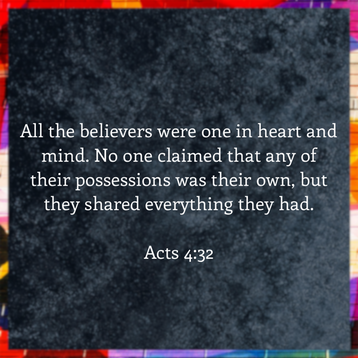|
Good morning!
Happy Thanksgiving! We're glad you decided to join us virtually this morning!
When we meet in person, we share our joys and concerns. Take time to think about the people you know who need help and comfort right now. You can share these in the comments if you would like. The prayer below is from lectionary resource website of Vanderbilt University.
As you pray, you may offer your own specific joys and concerns in the silent space provided.
Holy God, you have called us to follow in the way of your risen Son, and to care for those who are our companions, not only with words of comfort, but with acts of love. Seeking to be true friends of all, we offer our prayers on behalf of the church and the world.
(Silent space for personal joys and concerns) Guide us in the path of discipleship, so that, as you have blessed us, we may be a blessing for others, bringing the promise of the kingdom near by our words and deeds. Amen.
This week's lesson is on Acts 4:32-37 and Acts 5:1-11.
Introduction
There’s a classic old cowboy song titled, “Home on the Range.” Its chorus goes like this: Home, home on the range, Where the deer and the antelope play; Where seldom is heard a discouraging word And the skies are not cloudy all day. It’s a romantic view of cowboy life in the past, but the real history of the Wild West was full of reasons for discouragement, not least of which was violence against native peoples. Discouragement also thrives among us today. And the early church had its share of discouragement as well. Then, like now, encouragers were needed. They are examples to us all. Lesson context Luke and Acts make up a two-volume work written by the same author. The first volume tells the story of Jesus’s life and ministry, his crucifixion and resurrection. The book of Acts tells the story of the early church after Jesus’s ascension. We look at the book of Acts to understand the nature of the church in its infancy. By doing so, we hope to understand Christ’s intention for his church as enacted through his apostles and thereby understand what the church should be today. We also learn from the book of Acts that the early church had its problems, too. One of them is the problem of full financial disclosure. We will look at one such instance in our lesson today. Acts 4:32-37 All the believers is unanimous, for they are one in heart and mind. Heart signifies the determined will of these people — they had common desires and plans. Mind is elsewhere translated “soul”. It represents the inner self, the life force. The Old Testament uses the term “heart and soul” to indicate the entire person. The people are called to love God with all of their being; they were to leave no part separate to adore any other god. Just as the church was united in its devotion to the Lord, so the believers were united in showing that love through service to one another. Their purpose was to share wealth so that no one suffered poverty’s devastations. This loving, unified community allowed the apostles to continue their powerful preaching without undue distractions. With the crucifixion still fresh in the minds of Jerusalem’s residents, the apostles proclaimed the resurrection of … Jesus. About 3,000 people responded to Peter’s preaching on Pentecost, a number that later grew to 5,000. Some of them were pilgrims who had come to Jerusalem for the Passover celebration, but many hundreds or more were involved in the weekly or daily fellowship. Some of them would have been wealthy while others struggled to put food on the table. The Spirit moved the hearts of the wealthy to sell land and houses from time to time and to release the proceeds to the apostles. They laid the money at the apostles’ feet, giving it to the church leaders to be used appropriately. Joseph, who was from the tribe of Levi and the island of Cyprus, sold a field that he owned and handed the proceeds over to the apostles. This is the only time this disciple is called Joseph in the book of Acts. He is more commonly known as Barnabas, which is a nickname meaning “son of encouragement. It was given to him by the apostles because it reflected his character. As was the custom, he gave without expecting anything in return. More than words “Discouragement is not the absence of adequacy but the absence of courage,” said Neal A. Maxwell, late member of the Quorum of the Twelve Apostles of the Church of Jesus Christ of Latter Day Saints. People all around us have the ability, but not the courage, to accomplish their full potential. When we encourage them, we are not building them up with platitudes or falsehoods. Instead, we are helping them see the truth about themselves and the situation they are facing. Sometimes our encouragement offers more than words. When we help a struggling college student with his tuition, when we buy a bag of groceries for an underpaid single mother, or when we send a Christmas gift to a missionary far from home, we’re doing more than telling them better days are ahead. We’re actually relieving pressure that is preventing them from doing their best. Study the life of Barnabas and you’ll see that he always did more than talk. He gave. He helped. He accompanied. Which of those last three is your weakest area?
Acts 5:1-11
The story of Ananias and his wife Sapphira is the negative counterpoint to the story of Barnabas and his forthright generosity. Although we may think that the couple’s problem was that they gave less than 100 percent after selling their property, that was not the problem. The decision to sell their property was not wrong. Giving less than 100 percent was not wrong. What was wrong was deliberately misrepresenting, lying, about what they had done. The plot was to deceive the apostles by making them appear more generous than they were, and it tainted an otherwise commendable act of generosity. To lie to humans is bad enough, but to lie to the Holy Spirit is much worse! Ananias knew that the money he had placed at Peter’s feet was only part of the sale price, and, to his surprise, Peter knew it, too. Ananias could have admitted that he could only afford to give half of the sale price, but he falsely claimed it was the entire amount. By doing that he committed a moral fraud. Peter’s statement, “You have not lied just to human beings but to God” repeats and emphasizes the accusation of sinning against the deity. The act also betrays Ananias’s lack of belief in God’s ability to know about such an attempt. Thus we are struck by an absurd attempt to lie to God. God always knows the truth and will never be fooled by human deception. Neither God nor Peter gave him a chance to mount a defense. The time for lying was over. Ananias’s death was clear evidence to those watching that God knew his heart and was angry. Fear seized everyone who heard about what had happed. Sometimes fear is a reaction that shows a lack of faith, but in this case it shows a proper respect for God. Throughout the Bible, when people encounter God or God’s representatives, they naturally become afraid. After Ananias was buried quickly and unceremoniously, his wife Sapphira came in, not having heard the news. Peter asked her if the amount that was given was the sale price for the land, giving her the opportunity to tell the truth. Sadly, she backed up Ananias’s false claim. Peter charged her with trying to test the Spirit of the Lord. Then he revealed what had happened to Ananias and what was going to happen to her. “Listen!” Peter said. “The feet of the men who buried your husband are at the door, and they will carry you out also.” She fell down at his feet and died. Those who test the patience of God play a dangerous game, a fool’s game. The sense of testing here is very similar to Jesus’ temptation in Luke 4:1-13, where Satan attempts to get Jesus to act contrary to Jesus’ identity as the Son of God. Jesus did not fail in the wilderness; the Spirit did not fail in Jerusalem. If a similar situation regarding intentional deception in your church came to your attention, what would you do? Is there a single, step-by-step way to handle such a situation? Why or why not? This story troubles many of us. A primary problem is that the penalty of death seems too severe to us. They did a good thing, giving money to the poor, although in a tainted and selfish manner. Didn’t they deserve some credit? Furthermore, the story puts Peter in an uncomfortable role as the stern judge who does not hesitate to pronounce the fate that would befall Sapphira. Couldn’t he at least have given Sapphira a warning? I think of Peter’s own denial of Jesus while Jesus was on trial and how Jesus later reconciled with him after the resurrection. What seems worse to us? Denying you even know Christ? Or saying that you gave all when you only gave a portion? Perhaps there is more to each of these situations that we can know. Perhaps we can only say that the Holy Spirit knows our heart and that God knew that Peter’s fear momentarily overpowered his devotion to Jesus. God also knew the hearts of Ananias and Sapphira. The Spirit knows our hearts as well, and a temporary lapse is much different than a superficial or artificial faith that really doesn’t believe in God’s all-knowing and all-encompassing power. In addition, the Spirit is concerned with keeping the church holy. Though the world may claim that the end justifies the means, Christian ethics requires the ends and the means to work together virtuously. The story of the fate of Ananias and Sapphira struck fear into the hearts of the church and everyone who heard about it. So their lives and deaths served as an example that people could not fool God or the church with false piety and lies. Conclusion While we may not understand exactly how the Spirit works in the church or what the Spirit is up to all the time, church business is serious business. Faith and fraud cannot coexist. For this reason, when we allow the Spirit to lead us, we will be genuine givers like Barnabas, not sly and deceitful like Ananias and Sapphira. Dishonesty within the church can destroy it entirely and must be dealt with severely. The very thought of doing a good deed to receive kudos and honors violates the spirit of charity. As Jesus taught, when we give for relief of the poor, it should be so private that our left hand doesn’t know about the money our right hand put in the offering basket (Matthew 6:3). This requires a delicate balance of being a witness at the same time (5:16). But when we yield our hearts to the Spirit, we know that the Spirit sees our deeds and blesses them (6:4). Prayer Lord God, forgive us when we attempt to deceive you and Christ’s body. Help us to genuinely seek to encourage. In Jesus’ name we pray. Amen. Benediction This week's benediction comes from the Common English Bible.
Next week's lesson will be on James 2:1-13.
0 Comments
Leave a Reply. |
AuthorWe are a small, rural Presbyterian church in southwestern Pennsylvania. Archives
July 2024
Categories
All
|



 RSS Feed
RSS Feed